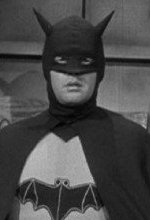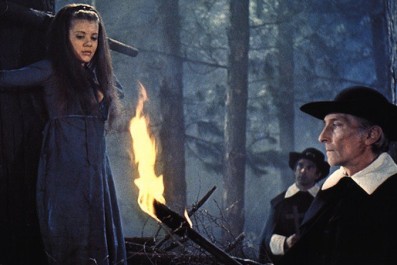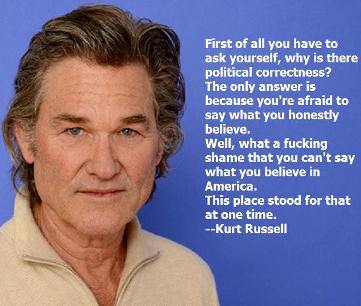
I thought I’d look at the live-action Batmen when Batfleck was new. Now that Ben Affleck is out, I’ve updated this page, and await WB’s newest choice for the role. Oh, there will be another. While the quality of the character is a major element in the overall quality of his films, it is far from a 1-to-1 relationship. You can have a good Batman in a weak film and the reverse is true. In some cases, other elements—emotion, theme, plot, or just fantastic effects and art direction—have more to do with the quality of the film than Batman himself.
When ranking Batmen, it isn’t just the acting. That has much to do with it, as does the charm of the actor. But it also makes a difference if Batman is frightening when he is supposed to be, funny if he is supposed to be, and complex. The best Batman should be fun to watch in a fight and in a conversation. And he has to fit his world.
A key factor is that Batman doesn’t make sense in our universe. He’s absurd by nature. After The Dark Knight came out I had a fanboy tell me, with utter conviction, that dressing up in a bat suit to fight crime would completely work in our world and makes sense. Ummmm. No. No it doesn’t.
Saying he is absurd is not an insult. Batman bypasses reality. He enters the land of myth. He exists as symbol and metaphor. This works in a comic which by its nature is symbolic. Film can have a harder time as it is often used to approach reality. So somehow, Batman needs to work in this medium, and there are different ways that can be done. A good Batman must explain why he dresses in a bat costume and fights crime. They do not all pull that off.
And I have to judge a person by the company he keeps. Batman surrounds himself with girlfriends, family members, a butler, and sometimes boys that he picks up. He’s not defined by his enemies (though his films might be), but he is, partly, by his friends and allies.
So, starting with #9
#9 Robert Lowrey (Batman and Robin—1949)
 The second screen adaptation of Batman, this follow-up to the ’43 serial is a very different critter and far more like the comics than the first. This is action and adventure, played straight. Batman is no longer a government agent (Yup, that’s what he was in ’43), but the mysterious crime fighter we all know. There is no connection between the two serials, which seemed like it was for the best as the former could be embarrassing. That said, I found some enjoyment in watching The Batman ’43 while I was only bored with this one.
The second screen adaptation of Batman, this follow-up to the ’43 serial is a very different critter and far more like the comics than the first. This is action and adventure, played straight. Batman is no longer a government agent (Yup, that’s what he was in ’43), but the mysterious crime fighter we all know. There is no connection between the two serials, which seemed like it was for the best as the former could be embarrassing. That said, I found some enjoyment in watching The Batman ’43 while I was only bored with this one.
Lowrey is less charming than his predecessor, making him a less compelling Bruce Wayne, but he is a more imposing Batman. He’s not in the kind of muscle-bound shape expected of post-1980s heroes, but he is powerful-looking enough. His voice is deep and strong which helps in his characterization.
 The only positive thing I can say about his costume is that it is a big step up from the ’43 version. It’s still embarrassing. Apparently realizing this, both Batman and Robin tend to stand so that the more ridiculous aspects of their clothing are covered by their capes.
The only positive thing I can say about his costume is that it is a big step up from the ’43 version. It’s still embarrassing. Apparently realizing this, both Batman and Robin tend to stand so that the more ridiculous aspects of their clothing are covered by their capes.
It’s surprising that between the serials Bruce Wayne’s living arrangements have been downgraded. He now lives in a two-story suburban home, and drives a typical sedan. At least ’43 Batman had a convertible. I’m not sure this Wayne could afford to be a crimefighter, though it does make his outfit more understandable; he’s probably sewing it himself.
Batlowrey is simply dull. He’s hardly given a chance to be anything else. There’s no attempt at character development and most of his lines are procedural: “Yes Robin, the Wizard’s men will be there. We should drive down this road.” “Wait here while I find out what’s wrong. The truck is parked around the curve.” It doesn’t leave much opportunity to establish a personality. Does it make sense that he dresses up in a costume to fight crime? Who knows? There isn’t enough personality here to make any definite claim about anything.
#8 Robert Pattinson (The Batman—2022)
 Pattinson starts at a disadvantage as The Batman is two very different films jammed together. Should he be the odd noir-detective in the dark procedural drama or should he be the immortal superhero of the kid’s action flick? There’s no winning because either choice would make him wrong for half the film. So it is interesting that he went with neither, and went with constantly distracted emo highschooler. It is certainly a choice.
Pattinson starts at a disadvantage as The Batman is two very different films jammed together. Should he be the odd noir-detective in the dark procedural drama or should he be the immortal superhero of the kid’s action flick? There’s no winning because either choice would make him wrong for half the film. So it is interesting that he went with neither, and went with constantly distracted emo highschooler. It is certainly a choice.
This Batman is quiet, still, and deeply unhappy at all times. He keeps a diary and I suspect the pages we don’t see are filled with his vampire poetry. If his parents hadn’t died, he’d be yelling at them that “You just don’t understand me.” He’s way overdramatic, and Pattinson doesn’t have the voice to pull that off. And when not making off-putting proclamations, he’s muttering. Someone needs to tell him to speak up and enunciate. On the plus side, this Batman can fight, and while those scenes might not be exciting, they are visceral.
He’s also a detective, which is a plus for a character who’s supposed to be the world’s greatest detective; most Batmen don’t do any detecting at all. Unfortunately, he’s a really bad detective.
 As for Bruce Wayne, there is no Bruce Wayne. It’s not even that Pattinson’s Wayne is the same as his Batman. There is simply no Wayne at all.
As for Bruce Wayne, there is no Bruce Wayne. It’s not even that Pattinson’s Wayne is the same as his Batman. There is simply no Wayne at all.
His batsuit is a mixed bag. Compared to the average, it’s pretty good, except for the large clomping boots. His stomping is actually pointed out when a gang hangs around going “huh, wonder what that is.” He needs to get new shoes or all the smarter crooks will just avoid him. But there’s a bigger problem with the suit in that it is out of place in this world. In this gritty, noir universe, some guy wearing little ears just looks silly. And is this Batman crazy enough to wear a rubber bat costume? Well, he’s crazy, but more in the rocking on the floor weeping kind of way. He’s suffering from depression. Sure, he would wear black eye-liner but a Bauhaus T-shirt makes more sense then a silver bat logo.
#7 Val Kilmer (Batman Forever—1995)
 Joel Schumacher started with Burton’s gothic world, and then just screwed it all up. Sometimes it is hard to tell what is wrong, besides everything, and that includes Batman. Kilmer had a spotty career before becoming the Dark Knight and a disastrous one after. He brings his good looks to the role and little else. Kilmer’s Batman isn’t fully camp, just enough not to be taken seriously while not enough to be any fun. This Batman isn’t deep, isn’t haunted, isn’t meaningful, isn’t silly, and isn’t a bad joke. He isn’t anything. He’s slicker than Keaton’s—more poised. He is in control of himself. And he’s barely noticeable.
Joel Schumacher started with Burton’s gothic world, and then just screwed it all up. Sometimes it is hard to tell what is wrong, besides everything, and that includes Batman. Kilmer had a spotty career before becoming the Dark Knight and a disastrous one after. He brings his good looks to the role and little else. Kilmer’s Batman isn’t fully camp, just enough not to be taken seriously while not enough to be any fun. This Batman isn’t deep, isn’t haunted, isn’t meaningful, isn’t silly, and isn’t a bad joke. He isn’t anything. He’s slicker than Keaton’s—more poised. He is in control of himself. And he’s barely noticeable.
He isn’t really Batman. Kilmer could have been playing any generic action character. There are worse things than being bad. There is being nonexistent. Other versions of the character could be considered worse in multiple way, but at least they are memorable. Clooney is not good, but if you think about it, you can remember him. What do you remember of Kilmer? Perhaps only the cheesy line, “It’s the car, right? Chicks dig the car.”
 His Bruce Wayne is pretty much the same as his Batman, which is to say, generic. He edges more toward smarmy, which isn’t terrible for Wayne, but is yet another reason not to care about him.
His Bruce Wayne is pretty much the same as his Batman, which is to say, generic. He edges more toward smarmy, which isn’t terrible for Wayne, but is yet another reason not to care about him.
At least he hangs with a reputable Alfred, which he needs since he also hangs with the most annoying Robin. His kinda-sorta-girlfriend has possibilities, but the relationship is so poorly presented that I’m not giving him points for her.
I can’t dislike Batkilmer, as that would require some level of interest.
#6 Lewis G Wilson (The Batman—1943)
 Wilson was the very first Batman in a 1943 serial. For ranking, he isn’t in a fair competition. Cash was not lavished on the production, which is evident in every frame. It’s no surprise that the effects are lacking in those pre-computer times, but they were capable of costume design in 1943. I suspect little money was allocated, giving us the worst batsuit.
Wilson was the very first Batman in a 1943 serial. For ranking, he isn’t in a fair competition. Cash was not lavished on the production, which is evident in every frame. It’s no surprise that the effects are lacking in those pre-computer times, but they were capable of costume design in 1943. I suspect little money was allocated, giving us the worst batsuit.
The fight choreography was what you’d expect from a ‘40s serial. It would have been nice for a few more bucks to go there as well as to wardrobe, but unlike the outfit, combat is mildly acceptable.
Wilson was stuck in a low budget kid’s propaganda show, that looks silly now and probably didn’t look that much better then. As a war time serial, it is painful racist, proclaiming how good it was that the government had rounded up those “shifty-eyed” Japs that just happened to also be American citizens. Under the circumstances, Wilson could only do so well. But within the limits he was bound by, he’s charming.
This Batman is not a disturbed vigilante, unable to deal with his parents’ death. He’s an agent fighting War-time spies and traitors for Uncle Sam. As Bruce Wayne, he’s a bored playboy who thinks that The Batman is a show off. As The Batman (it is “The Batman,” not “Batman”), he’s brave, noble, and manly, if perhaps lacking the physique we’ve become used to. A few weeks in the gym, or a costume that lifted and compressed would have elevated Wilson. As Bruce Wayne, he looks good, but not so much as Batman.
As The Batman (it is “The Batman,” not “Batman”), he’s brave, noble, and manly, if perhaps lacking the physique we’ve become used to. A few weeks in the gym, or a costume that lifted and compressed would have elevated Wilson. As Bruce Wayne, he looks good, but not so much as Batman.
I give him a point for the cruel way he says “Oh, those are my bats. It is nearing their feeding time.” Too bad the bats are sad shadows and the “Bats cave” (yes, there is an “s”) is a tiny stage. The poor cave gets a bit of a pass since this serial created it, not the comics. Likewise, this is the first appearance of Alfred.
Batwilson’s girlfriend isn’t a detriment. His Robin is surprisingly competent and is never annoying. He beats the Chris O’Donnell version, which I understand is faint praise.
Judged purely by acting and personality, I’d move him up a slot, but there’s no getting around the shoddy nature of the production.
#5 George Clooney (Batman & Robin—1997)
 Clooney’s Batman finished the transition from the complicated, gothic character Tim Burton had given us to full-on camp. It is a much lesser Batman, but at least it is fully something, even if that something isn’t particularly good. Watching Batman & Robin is like watching the old TV show done with a pile of cash, updated FX, and less artistry. It doesn’t reach the level of fun of the TV show, lacking its wit and understand of the material, nor does Clooney reach the level of that Batman. He’s helped by little. The script is weak, Robin is terrible, the subplot of antagonism between him and Robin make him out as a bit of a jerk, and he’s got the silliest suit of the feature films. I don’t even mind the Bat-nipples, not when there’s the spiky Bat-ears to consider. He does have a good Alfred and I find Alicia Silverstone adorable, so that’s a little help. This is a children’s Batman for a children’s movie.
Clooney’s Batman finished the transition from the complicated, gothic character Tim Burton had given us to full-on camp. It is a much lesser Batman, but at least it is fully something, even if that something isn’t particularly good. Watching Batman & Robin is like watching the old TV show done with a pile of cash, updated FX, and less artistry. It doesn’t reach the level of fun of the TV show, lacking its wit and understand of the material, nor does Clooney reach the level of that Batman. He’s helped by little. The script is weak, Robin is terrible, the subplot of antagonism between him and Robin make him out as a bit of a jerk, and he’s got the silliest suit of the feature films. I don’t even mind the Bat-nipples, not when there’s the spiky Bat-ears to consider. He does have a good Alfred and I find Alicia Silverstone adorable, so that’s a little help. This is a children’s Batman for a children’s movie.
Clooney managed better as Bruce Wayne, as long as Wayne wasn’t require to be mentally disturbed in any way. This is suave Wayne. Clooney just was Clooney, and since the actor is a suave millionaire, he pulled that off fine. And in this world, Wayne doesn’t need to be nuts, since apparently people run around in strange outfits all the time.  I have to assume Bruce’s neighbors get up each day and put on their ferret outfits before going to work.
I have to assume Bruce’s neighbors get up each day and put on their ferret outfits before going to work.
Joel Schumacher has a lot to answer for.
There’s not much positive I can say. Few people thought this Batman succeeded, including Clooney. But it matters not only how good he is, but how well he succeeded in what he was meant to be. Batclooney was meant to be an empty, uncomplicated, light-weight, kid’s Batman. And that he was.
#4 Ben Affleck (The DCEU—2016-2023)
 Poor Ben. He didn’t have a chance. It is hard to say what’s right and wrong with his portrayal as it is so inconsistent, due to no fault of his own. Zach Snyder wanted a worn and gritty Batman who might get raped in prison (yeah, he said that). Warner Bros wanted a Batman that would sell tickets. Affleck wanted not to be embarrassed. Well, it looks like no one got what they wanted.
Poor Ben. He didn’t have a chance. It is hard to say what’s right and wrong with his portrayal as it is so inconsistent, due to no fault of his own. Zach Snyder wanted a worn and gritty Batman who might get raped in prison (yeah, he said that). Warner Bros wanted a Batman that would sell tickets. Affleck wanted not to be embarrassed. Well, it looks like no one got what they wanted.
In BvS, Affleck looks the part. As a world-wearied Batman, he nails it. His speech and the pain evident on his face all proclaim this is a Batman who has been beaten down over and over again, but has been giving better than he’s been taking. He also makes no sense as a human and shifts his entire world view in a second. In Justice League, he’s sometimes in the range of what he was in the previous film, but other times he’s a quip machine, and quite often he’s just tired and bored. Affleck worked out to create the Batman body, but by the re-shoots he’d given up and let the suit do the work for him. Affleck was screwed over by the studio and he just gave up, and it shows. As the scripts didn’t know what Batman was supposed to be, the only guy who had a vision (Synder) had a horrible vision, and that “vision” was stripped away in re-shoots and editing, Batfleck isn’t anything. As for his cameo appearances, Affleck is just there for the paycheck.
His Bruce Wayne isn’t substantially different than his Batman. Both are worn out, both seem to lack the people skills to do their jobs, and both are wildly inconsistent between and within pictures.
 His fighting skills are a mixed bag as they are so obviously computer enhanced. I like CGI, but mainly if I can’t tell it is CGI. Even with the post production polish, he’s a reasonably exciting Batman to watch in a fight, though there’s no real wow factor.
His fighting skills are a mixed bag as they are so obviously computer enhanced. I like CGI, but mainly if I can’t tell it is CGI. Even with the post production polish, he’s a reasonably exciting Batman to watch in a fight, though there’s no real wow factor.
As a thinking Batman, he falls apart. Batman is the great detective, a genius with gadgets. This Batman is incapable of snooping in a house, is fooled by a psychopath, and really comes up with no workable plan. You can put it down to rage, but that doesn’t make him a better character. It just explains the problem. This may be the dimmest Batman of all time. Intellectually, he’s got nothing.
And then there is the question of him dressing in a bat outfit. Likes Bale’s version, Batfleck has anger issues (sometimes), which explains him going out punching and even branding criminals. But he just isn’t odd enough to have said one day, “Hey, I think little ears on a cowl would be a great idea.”
He gets a point for hanging with a superb Alfred.
#3 Christian Bale (The Dark Knight trilogy—2005-2012)
 Many choose The Dark Knight as the best Batman film, but Bale rarely ranks so high. The three Nolan films work based on the larger twisting structure and themes more than Batman himself. Bale’s Bruce Wayne is generally considered a good one, but his suited Dark Knight ranks lower. Partly that’s due to his sanity. He’s too in control. But mainly it is his voice, and that flaw falls on Nolan. Instead of the roughness Keaton added when fighting crime, Bale goes for full on cancer-voice. It’s a cross between unintelligible and laughable. And it only got worse in the second film when Nolan decided to tweak it beyond human capability in post production. Kevin Conroy, the voice of the animated Batman, stated that the voice was ridiculous and Bale needed to stop doing it—if anyone should know, it is Conroy. It was a running joke in The Lego Movie, whose Batman would rate very high on my list if I was including animated films.
Many choose The Dark Knight as the best Batman film, but Bale rarely ranks so high. The three Nolan films work based on the larger twisting structure and themes more than Batman himself. Bale’s Bruce Wayne is generally considered a good one, but his suited Dark Knight ranks lower. Partly that’s due to his sanity. He’s too in control. But mainly it is his voice, and that flaw falls on Nolan. Instead of the roughness Keaton added when fighting crime, Bale goes for full on cancer-voice. It’s a cross between unintelligible and laughable. And it only got worse in the second film when Nolan decided to tweak it beyond human capability in post production. Kevin Conroy, the voice of the animated Batman, stated that the voice was ridiculous and Bale needed to stop doing it—if anyone should know, it is Conroy. It was a running joke in The Lego Movie, whose Batman would rate very high on my list if I was including animated films.
While Bale’s Wayne ranks higher than his Batman, it is mainly due to the complexity of his character. His lack of warmth makes it hard to ever feel for him, creating a real distance between him and the audience. Again, this is a tendency of Nolan’s. And This Batman is not nearly nuts enough to go around dressing like a bat. He’s got big time anger issues, but those would surface in violence, not violence dressed as a flying mammal.
 I rank Batmans/Waynes on their entire personalities, including what they like—that means their relationships count. And Bale’s Wayne has the worst taste in women. If there is one consensus amongst fans, it is that Rachel is terrible. Much of that comes from the primitive acting talents of Katie Holmes (Maggie Gyllenhaal was better when she took over, but better does not mean good; Nolan is notorious for his inability to direct female characters), but whatever the cause, his dating life is not a plus.
I rank Batmans/Waynes on their entire personalities, including what they like—that means their relationships count. And Bale’s Wayne has the worst taste in women. If there is one consensus amongst fans, it is that Rachel is terrible. Much of that comes from the primitive acting talents of Katie Holmes (Maggie Gyllenhaal was better when she took over, but better does not mean good; Nolan is notorious for his inability to direct female characters), but whatever the cause, his dating life is not a plus.
No one could question Bale’s commitment. And his physicality is impressive. Plus, when it comes to expressing those anger issues, he’s a genius (perhaps more than is good for him considering his famous rant on the set of Terminator 4). But Bale himself acknowledges that he never quite succeeded, and he prefers Adam West.
#2 Adam West (Batman: The Movie -1966)
 If you are going to go camp, go all the way. Adam West is the most earnest Batman in the silliest of settings and that makes it all OK. His voice alone elevates him above the also-rans below. He’s a comedy Batman who never acknowledges the joke, but lives it. Not everyone wants a pure, virtuous, noble, unshakeable, always calm, kindly, polite Batman, but if you do, here’s your guy.
If you are going to go camp, go all the way. Adam West is the most earnest Batman in the silliest of settings and that makes it all OK. His voice alone elevates him above the also-rans below. He’s a comedy Batman who never acknowledges the joke, but lives it. Not everyone wants a pure, virtuous, noble, unshakeable, always calm, kindly, polite Batman, but if you do, here’s your guy.
Batman is inherently silly. He’s a symbol and has real problems when taken literally. This Batman recognized the absurdity and runs with it. The entire world is a joke—enjoy it.
West looks the part of Batman, both handsome and powerful. No, he doesn’t have the six-pack build, but that has rarely been the sign of physically strong men but of ones who have a trainer who has muscle definition machines. And as both Wayne and Batman, he speaks like a god. His velvet tones gives depth in the middle of the ridiculous. None of the other Batmen can come close and if you are doing direct comparisons, it’s a real problem for the others. This is the iconic voice–everything else is less.
 Similarly to the Schumacher-verse, the world of this Batman is one where dressing up like a bat or bird or any kind of cosplay is just normal behavior. He doesn’t have to explain why he dresses as he does. You have to explain why you don’t.
Similarly to the Schumacher-verse, the world of this Batman is one where dressing up like a bat or bird or any kind of cosplay is just normal behavior. He doesn’t have to explain why he dresses as he does. You have to explain why you don’t.
The only problem with this Batman is if you are just against the concept of a funny, joyful, good-time, camp Batman. If that notion upsets you, then no Batman that fits that will be to your liking. But figure, of all the camp Batman you could have, would any other have been better? For what he is, he’s the best.
And I do give him points for his companions. He has a solid Alfred, a perfectly fitting Robin, and even an amusing Aunt. And if you do not like Yvonne Craig as Batgirl, I fear there is no help for you.
#1 Michael Keaton (Batman/Batman Returns—1989-1992)
 It shouldn’t be a surprise who tops the list. In the great Batmen debates of the last twenty years, Keaton usually comes out first and I can’t imagine that Affleck will change that.
It shouldn’t be a surprise who tops the list. In the great Batmen debates of the last twenty years, Keaton usually comes out first and I can’t imagine that Affleck will change that.
I remember when Keaton was cast. Batman fanboys went nuts. He was wrong in everyway. He was too comic. He was too short. He wasn’t like their fantasy. Well, they were wrong.
Keaton nails the two sides of the character, Bruce Wayne and Batman. His Batman is dangerous, and for the first, and only time, Batman is scary beyond his violence. His is the only Batman that could frighten criminals in a fundamental way, not just because they don’t like getting beaten up. There’s something unhinged about him.
While Batkeaton is treading the line of psychosis, his Bruce Wayne is even better. No reasonable man would choose to dress up like a Bat to fight crime. Bale’s Bat and Batfleck are both emotionally messed up, but primarily they suffer from anger issues. Keaton’s Wayne is more substantially disturbed. Yes, he’s angry, but it is so much more. This is the only Bruce Wayne I can believe would choose to become Batman. I could believe him choosing to wear a mask made of human skin and carry a chainsaw too.
 Sometimes the phrase “gritty realism” is brought up around the Bale Batman, but it is always inaccurate. Keaton’s Batman is by far the most realistic. As an actor, he has a talent of being an every man. He’s someone you can imagine seeing at the grocery story. But at the same time, he can embody insanity, a lack of control, and a ruthless dedication. That is Batman.
Sometimes the phrase “gritty realism” is brought up around the Bale Batman, but it is always inaccurate. Keaton’s Batman is by far the most realistic. As an actor, he has a talent of being an every man. He’s someone you can imagine seeing at the grocery story. But at the same time, he can embody insanity, a lack of control, and a ruthless dedication. That is Batman.
He does well in the fights and his costume is one of the best, though it shows some mobility problems. He also has a quality Alfred.
I’ve enjoyed several other Batmen, but only Keaton has been a total success. When recently asked if he, like Bale, felt a bit of jealousy at someone else playing the part, he replied that he didn’t, because he was Batman, and was secure in that. Which is why he is Batman.




 The second screen adaptation of Batman, this follow-up to the ’43 serial is a very different critter and far more like the comics than the first. This is action and adventure, played straight. Batman is no longer a government agent (Yup, that’s what he was in ’43), but the mysterious crime fighter we all know. There is no connection between the two serials, which seemed like it was for the best as the former could be embarrassing. That said, I found some enjoyment in watching The Batman ’43 while I was only bored with this one.
The second screen adaptation of Batman, this follow-up to the ’43 serial is a very different critter and far more like the comics than the first. This is action and adventure, played straight. Batman is no longer a government agent (Yup, that’s what he was in ’43), but the mysterious crime fighter we all know. There is no connection between the two serials, which seemed like it was for the best as the former could be embarrassing. That said, I found some enjoyment in watching The Batman ’43 while I was only bored with this one. The only positive thing I can say about his costume is that it is a big step up from the ’43 version. It’s still embarrassing. Apparently realizing this, both Batman and Robin tend to stand so that the more ridiculous aspects of their clothing are covered by their capes.
The only positive thing I can say about his costume is that it is a big step up from the ’43 version. It’s still embarrassing. Apparently realizing this, both Batman and Robin tend to stand so that the more ridiculous aspects of their clothing are covered by their capes. Pattinson starts at a disadvantage as
Pattinson starts at a disadvantage as  As for Bruce Wayne, there is no Bruce Wayne. It’s not even that Pattinson’s Wayne is the same as his Batman. There is simply no Wayne at all.
As for Bruce Wayne, there is no Bruce Wayne. It’s not even that Pattinson’s Wayne is the same as his Batman. There is simply no Wayne at all. Joel Schumacher started with Burton’s gothic world, and then just screwed it all up. Sometimes it is hard to tell what is wrong, besides everything, and that includes Batman. Kilmer had a spotty career before becoming the Dark Knight and a disastrous one after. He brings his good looks to the role and little else. Kilmer’s Batman isn’t fully camp, just enough not to be taken seriously while not enough to be any fun. This Batman isn’t deep, isn’t haunted, isn’t meaningful, isn’t silly, and isn’t a bad joke. He isn’t anything. He’s slicker than Keaton’s—more poised. He is in control of himself. And he’s barely noticeable.
Joel Schumacher started with Burton’s gothic world, and then just screwed it all up. Sometimes it is hard to tell what is wrong, besides everything, and that includes Batman. Kilmer had a spotty career before becoming the Dark Knight and a disastrous one after. He brings his good looks to the role and little else. Kilmer’s Batman isn’t fully camp, just enough not to be taken seriously while not enough to be any fun. This Batman isn’t deep, isn’t haunted, isn’t meaningful, isn’t silly, and isn’t a bad joke. He isn’t anything. He’s slicker than Keaton’s—more poised. He is in control of himself. And he’s barely noticeable. His Bruce Wayne is pretty much the same as his Batman, which is to say, generic. He edges more toward smarmy, which isn’t terrible for Wayne, but is yet another reason not to care about him.
His Bruce Wayne is pretty much the same as his Batman, which is to say, generic. He edges more toward smarmy, which isn’t terrible for Wayne, but is yet another reason not to care about him. Wilson was the very first Batman in a 1943 serial. For ranking, he isn’t in a fair competition. Cash was not lavished on the production, which is evident in every frame. It’s no surprise that the effects are lacking in those pre-computer times, but they were capable of costume design in 1943. I suspect little money was allocated, giving us the worst batsuit.
Wilson was the very first Batman in a 1943 serial. For ranking, he isn’t in a fair competition. Cash was not lavished on the production, which is evident in every frame. It’s no surprise that the effects are lacking in those pre-computer times, but they were capable of costume design in 1943. I suspect little money was allocated, giving us the worst batsuit. As The Batman (it is “The Batman,” not “Batman”), he’s brave, noble, and manly, if perhaps lacking the physique we’ve become used to. A few weeks in the gym, or a costume that lifted and compressed would have elevated Wilson. As Bruce Wayne, he looks good, but not so much as Batman.
As The Batman (it is “The Batman,” not “Batman”), he’s brave, noble, and manly, if perhaps lacking the physique we’ve become used to. A few weeks in the gym, or a costume that lifted and compressed would have elevated Wilson. As Bruce Wayne, he looks good, but not so much as Batman. Clooney’s Batman finished the transition from the complicated, gothic character Tim Burton had given us to full-on camp. It is a much lesser Batman, but at least it is fully something, even if that something isn’t particularly good. Watching Batman & Robin is like watching the old TV show done with a pile of cash, updated FX, and less artistry. It doesn’t reach the level of fun of the TV show, lacking its wit and understand of the material, nor does Clooney reach the level of that Batman. He’s helped by little. The script is weak, Robin is terrible, the subplot of antagonism between him and Robin make him out as a bit of a jerk, and he’s got the silliest suit of the feature films. I don’t even mind the Bat-nipples, not when there’s the spiky Bat-ears to consider. He does have a good Alfred and I find Alicia Silverstone adorable, so that’s a little help. This is a children’s Batman for a children’s movie.
Clooney’s Batman finished the transition from the complicated, gothic character Tim Burton had given us to full-on camp. It is a much lesser Batman, but at least it is fully something, even if that something isn’t particularly good. Watching Batman & Robin is like watching the old TV show done with a pile of cash, updated FX, and less artistry. It doesn’t reach the level of fun of the TV show, lacking its wit and understand of the material, nor does Clooney reach the level of that Batman. He’s helped by little. The script is weak, Robin is terrible, the subplot of antagonism between him and Robin make him out as a bit of a jerk, and he’s got the silliest suit of the feature films. I don’t even mind the Bat-nipples, not when there’s the spiky Bat-ears to consider. He does have a good Alfred and I find Alicia Silverstone adorable, so that’s a little help. This is a children’s Batman for a children’s movie. I have to assume Bruce’s neighbors get up each day and put on their ferret outfits before going to work.
I have to assume Bruce’s neighbors get up each day and put on their ferret outfits before going to work. Poor Ben. He didn’t have a chance. It is hard to say what’s right and wrong with his portrayal as it is so inconsistent, due to no fault of his own. Zach Snyder wanted a worn and gritty Batman who might get raped in prison (yeah, he said that). Warner Bros wanted a Batman that would sell tickets. Affleck wanted not to be embarrassed. Well, it looks like no one got what they wanted.
Poor Ben. He didn’t have a chance. It is hard to say what’s right and wrong with his portrayal as it is so inconsistent, due to no fault of his own. Zach Snyder wanted a worn and gritty Batman who might get raped in prison (yeah, he said that). Warner Bros wanted a Batman that would sell tickets. Affleck wanted not to be embarrassed. Well, it looks like no one got what they wanted. His fighting skills are a mixed bag as they are so obviously computer enhanced. I like CGI, but mainly if I can’t tell it is CGI. Even with the post production polish, he’s a reasonably exciting Batman to watch in a fight, though there’s no real wow factor.
His fighting skills are a mixed bag as they are so obviously computer enhanced. I like CGI, but mainly if I can’t tell it is CGI. Even with the post production polish, he’s a reasonably exciting Batman to watch in a fight, though there’s no real wow factor. Many choose The Dark Knight as the best Batman film, but Bale rarely ranks so high. The three Nolan films work based on the larger twisting structure and themes more than Batman himself. Bale’s Bruce Wayne is generally considered a good one, but his suited Dark Knight ranks lower. Partly that’s due to his sanity. He’s too in control. But mainly it is his voice, and that flaw falls on Nolan. Instead of the roughness Keaton added when fighting crime, Bale goes for full on cancer-voice. It’s a cross between unintelligible and laughable. And it only got worse in the second film when Nolan decided to tweak it beyond human capability in post production. Kevin Conroy, the voice of the animated Batman, stated that the voice was ridiculous and Bale needed to stop doing it—if anyone should know, it is Conroy. It was a running joke in The Lego Movie, whose Batman would rate very high on my list if I was including animated films.
Many choose The Dark Knight as the best Batman film, but Bale rarely ranks so high. The three Nolan films work based on the larger twisting structure and themes more than Batman himself. Bale’s Bruce Wayne is generally considered a good one, but his suited Dark Knight ranks lower. Partly that’s due to his sanity. He’s too in control. But mainly it is his voice, and that flaw falls on Nolan. Instead of the roughness Keaton added when fighting crime, Bale goes for full on cancer-voice. It’s a cross between unintelligible and laughable. And it only got worse in the second film when Nolan decided to tweak it beyond human capability in post production. Kevin Conroy, the voice of the animated Batman, stated that the voice was ridiculous and Bale needed to stop doing it—if anyone should know, it is Conroy. It was a running joke in The Lego Movie, whose Batman would rate very high on my list if I was including animated films. I rank Batmans/Waynes on their entire personalities, including what they like—that means their relationships count. And Bale’s Wayne has the worst taste in women. If there is one consensus amongst fans, it is that Rachel is terrible. Much of that comes from the primitive acting talents of Katie Holmes (Maggie Gyllenhaal was better when she took over, but better does not mean good; Nolan is notorious for his inability to direct female characters), but whatever the cause, his dating life is not a plus.
I rank Batmans/Waynes on their entire personalities, including what they like—that means their relationships count. And Bale’s Wayne has the worst taste in women. If there is one consensus amongst fans, it is that Rachel is terrible. Much of that comes from the primitive acting talents of Katie Holmes (Maggie Gyllenhaal was better when she took over, but better does not mean good; Nolan is notorious for his inability to direct female characters), but whatever the cause, his dating life is not a plus. If you are going to go camp, go all the way. Adam West is the most earnest Batman in the silliest of settings and that makes it all OK. His voice alone elevates him above the also-rans below. He’s a comedy Batman who never acknowledges the joke, but lives it. Not everyone wants a pure, virtuous, noble, unshakeable, always calm, kindly, polite Batman, but if you do, here’s your guy.
If you are going to go camp, go all the way. Adam West is the most earnest Batman in the silliest of settings and that makes it all OK. His voice alone elevates him above the also-rans below. He’s a comedy Batman who never acknowledges the joke, but lives it. Not everyone wants a pure, virtuous, noble, unshakeable, always calm, kindly, polite Batman, but if you do, here’s your guy. Similarly to the Schumacher-verse, the world of this Batman is one where dressing up like a bat or bird or any kind of cosplay is just normal behavior. He doesn’t have to explain why he dresses as he does. You have to explain why you don’t.
Similarly to the Schumacher-verse, the world of this Batman is one where dressing up like a bat or bird or any kind of cosplay is just normal behavior. He doesn’t have to explain why he dresses as he does. You have to explain why you don’t. It shouldn’t be a surprise who tops the list. In the great Batmen debates of the last twenty years, Keaton usually comes out first and I can’t imagine that Affleck will change that.
It shouldn’t be a surprise who tops the list. In the great Batmen debates of the last twenty years, Keaton usually comes out first and I can’t imagine that Affleck will change that. Sometimes the phrase “gritty realism” is brought up around the Bale Batman, but it is always inaccurate. Keaton’s Batman is by far the most realistic. As an actor, he has a talent of being an every man. He’s someone you can imagine seeing at the grocery story. But at the same time, he can embody insanity, a lack of control, and a ruthless dedication. That is Batman.
Sometimes the phrase “gritty realism” is brought up around the Bale Batman, but it is always inaccurate. Keaton’s Batman is by far the most realistic. As an actor, he has a talent of being an every man. He’s someone you can imagine seeing at the grocery story. But at the same time, he can embody insanity, a lack of control, and a ruthless dedication. That is Batman.


 Eugie would be amused today. We had a rule in our house: Don’t hurt the spider people. Yes, Eugie called them spider people. Our home was not only a no kill zone for spiders, it was a “don’t touch them and let them have their own home in our home” zone. (This was brought into question when we got Hobkin, as he did not live by the same rules and thought spiders were delicious.) Part of this came from both of our tendencies not to kill things just for the hell of it, but much of it dates to our old home.
Eugie would be amused today. We had a rule in our house: Don’t hurt the spider people. Yes, Eugie called them spider people. Our home was not only a no kill zone for spiders, it was a “don’t touch them and let them have their own home in our home” zone. (This was brought into question when we got Hobkin, as he did not live by the same rules and thought spiders were delicious.) Part of this came from both of our tendencies not to kill things just for the hell of it, but much of it dates to our old home.
 I’m a movie guy. I write reviews, run a film festival, speak on film panels, and have been a judge at numerous other fests. So the Dramatic Presentation Hugo categories are my thing. They shouldn’t be entirely, as far more is allowed than movies and TV episodes, but it is rare for anything else to show up. So OK, let’s deal with those two categories.
I’m a movie guy. I write reviews, run a film festival, speak on film panels, and have been a judge at numerous other fests. So the Dramatic Presentation Hugo categories are my thing. They shouldn’t be entirely, as far more is allowed than movies and TV episodes, but it is rare for anything else to show up. So OK, let’s deal with those two categories.